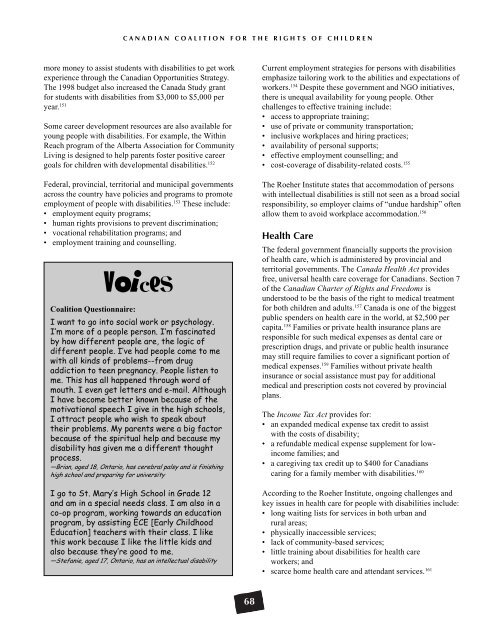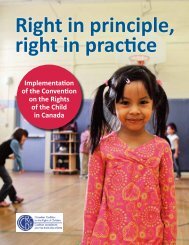Poste - Canadian Coalition for the Rights of Children
Poste - Canadian Coalition for the Rights of Children
Poste - Canadian Coalition for the Rights of Children
Create successful ePaper yourself
Turn your PDF publications into a flip-book with our unique Google optimized e-Paper software.
C A N A D I A N C O A L I T I O N F O R T H E R I G H T S O F C H I L D R E N<br />
more money to assist students with disabilities to get work<br />
experience through <strong>the</strong> <strong>Canadian</strong> Opportunities Strategy.<br />
The 1998 budget also increased <strong>the</strong> Canada Study grant<br />
<strong>for</strong> students with disabilities from $3,000 to $5,000 per<br />
year. 151<br />
Some career development resources are also available <strong>for</strong><br />
young people with disabilities. For example, <strong>the</strong> Within<br />
Reach program <strong>of</strong> <strong>the</strong> Alberta Association <strong>for</strong> Community<br />
Living is designed to help parents foster positive career<br />
goals <strong>for</strong> children with developmental disabilities. 152<br />
Federal, provincial, territorial and municipal governments<br />
across <strong>the</strong> country have policies and programs to promote<br />
employment <strong>of</strong> people with disabilities. 153 These include:<br />
• employment equity programs;<br />
• human rights provisions to prevent discrimination;<br />
• vocational rehabilitation programs; and<br />
• employment training and counselling.<br />
<strong>Coalition</strong> Questionnaire:<br />
Voices<br />
I want to go into social work or psychology.<br />
I’m more <strong>of</strong> a people person. I’m fascinated<br />
by how different people are, <strong>the</strong> logic <strong>of</strong><br />
different people. I’ve had people come to me<br />
with all kinds <strong>of</strong> problems--from drug<br />
addiction to teen pregnancy. People listen to<br />
me. This has all happened through word <strong>of</strong><br />
mouth. I even get letters and e-mail. Although<br />
I have become better known because <strong>of</strong> <strong>the</strong><br />
motivational speech I give in <strong>the</strong> high schools,<br />
I attract people who wish to speak about<br />
<strong>the</strong>ir problems. My parents were a big factor<br />
because <strong>of</strong> <strong>the</strong> spiritual help and because my<br />
disability has given me a different thought<br />
process.<br />
—Brian, aged 18, Ontario, has cerebral palsy and is finishing<br />
high school and preparing <strong>for</strong> university<br />
I go to St. Mary’s High School in Grade 12<br />
and am in a special needs class. I am also in a<br />
co-op program, working towards an education<br />
program, by assisting ECE [Early Childhood<br />
Education] teachers with <strong>the</strong>ir class. I like<br />
this work because I like <strong>the</strong> little kids and<br />
also because <strong>the</strong>y’re good to me.<br />
—Stefanie, aged 17, Ontario, has an intellectual disability<br />
68<br />
Current employment strategies <strong>for</strong> persons with disabilities<br />
emphasize tailoring work to <strong>the</strong> abilities and expectations <strong>of</strong><br />
workers. 154 Despite <strong>the</strong>se government and NGO initiatives,<br />
<strong>the</strong>re is unequal availability <strong>for</strong> young people. O<strong>the</strong>r<br />
challenges to effective training include:<br />
• access to appropriate training;<br />
• use <strong>of</strong> private or community transportation;<br />
• inclusive workplaces and hiring practices;<br />
• availability <strong>of</strong> personal supports;<br />
• effective employment counselling; and<br />
• cost-coverage <strong>of</strong> disability-related costs. 155<br />
The Roeher Institute states that accommodation <strong>of</strong> persons<br />
with intellectual disabilities is still not seen as a broad social<br />
responsibility, so employer claims <strong>of</strong> “undue hardship” <strong>of</strong>ten<br />
allow <strong>the</strong>m to avoid workplace accommodation. 156<br />
Health Care<br />
The federal government financially supports <strong>the</strong> provision<br />
<strong>of</strong> health care, which is administered by provincial and<br />
territorial governments. The Canada Health Act provides<br />
free, universal health care coverage <strong>for</strong> <strong>Canadian</strong>s. Section 7<br />
<strong>of</strong> <strong>the</strong> <strong>Canadian</strong> Charter <strong>of</strong> <strong>Rights</strong> and Freedoms is<br />
understood to be <strong>the</strong> basis <strong>of</strong> <strong>the</strong> right to medical treatment<br />
<strong>for</strong> both children and adults. 157 Canada is one <strong>of</strong> <strong>the</strong> biggest<br />
public spenders on health care in <strong>the</strong> world, at $2,500 per<br />
capita. 158 Families or private health insurance plans are<br />
responsible <strong>for</strong> such medical expenses as dental care or<br />
prescription drugs, and private or public health insurance<br />
may still require families to cover a significant portion <strong>of</strong><br />
medical expenses. 159 Families without private health<br />
insurance or social assistance must pay <strong>for</strong> additional<br />
medical and prescription costs not covered by provincial<br />
plans.<br />
The Income Tax Act provides <strong>for</strong>:<br />
• an expanded medical expense tax credit to assist<br />
with <strong>the</strong> costs <strong>of</strong> disability;<br />
• a refundable medical expense supplement <strong>for</strong> lowincome<br />
families; and<br />
• a caregiving tax credit up to $400 <strong>for</strong> <strong>Canadian</strong>s<br />
caring <strong>for</strong> a family member with disabilities. 160<br />
According to <strong>the</strong> Roeher Institute, ongoing challenges and<br />
key issues in health care <strong>for</strong> people with disabilities include:<br />
• long waiting lists <strong>for</strong> services in both urban and<br />
rural areas;<br />
• physically inaccessible services;<br />
• lack <strong>of</strong> community-based services;<br />
• little training about disabilities <strong>for</strong> health care<br />
workers; and<br />
• scarce home health care and attendant services. 161




